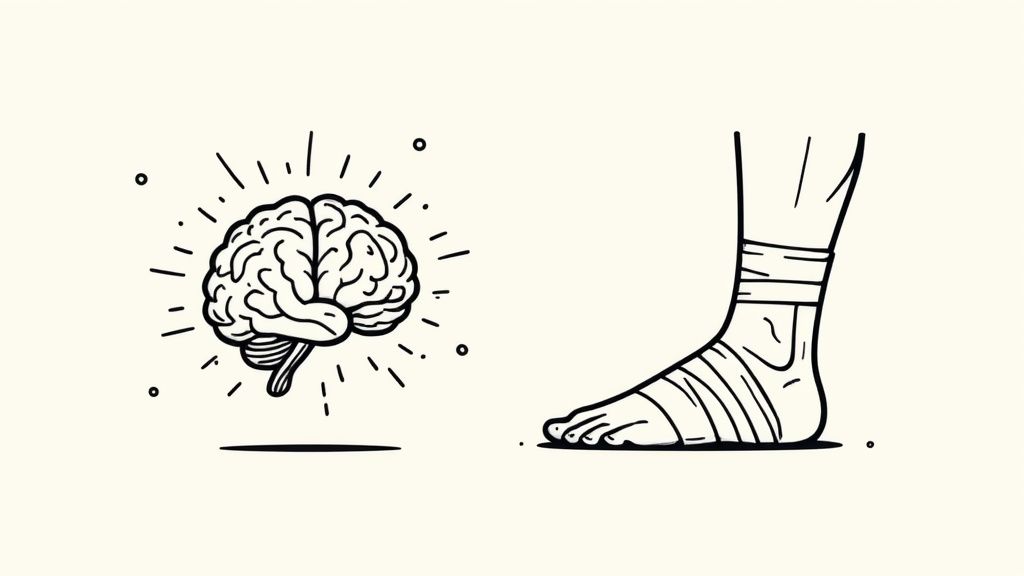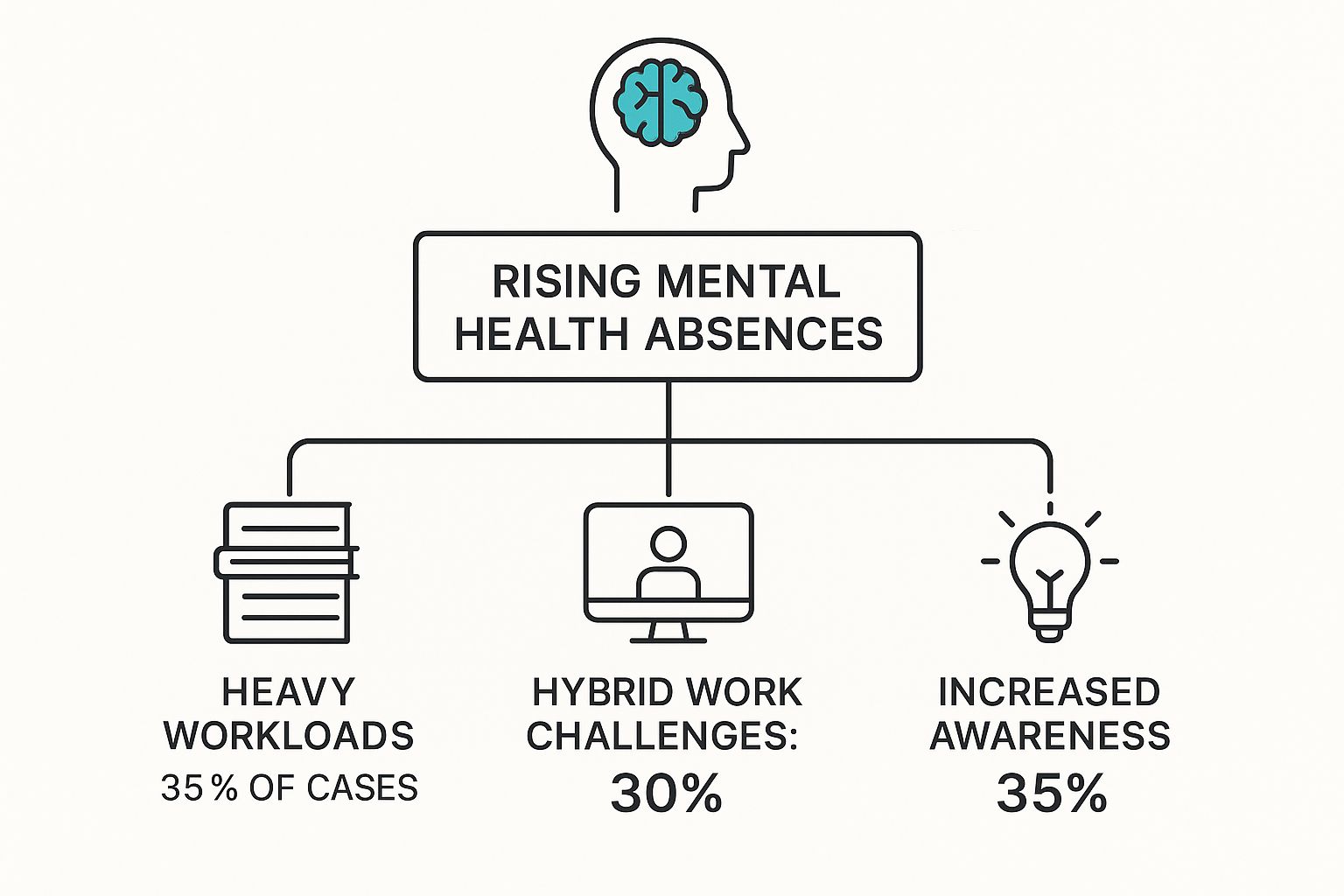Sick Leave Mental Health: Your Rights in the UK

Let's get one thing straight from the outset: taking sick leave for your mental health is every bit as valid as taking it for the flu or a broken bone. Under UK law, conditions like anxiety, depression, and burnout are fully protected reasons to take time off. Your mental wellbeing is a legitimate, crucial reason for absence.
Is Mental Health a Valid Reason for Sick Leave?

Yes, without a doubt. In the UK, the law makes no distinction between physical and mental health. If you are unwell, you are unwell. So, if severe stress, anxiety, or depression is making it impossible for you to do your job properly, you have every right to take sick leave.
Think of it this way: no one would expect you to come in and run a marathon on a sprained ankle. Trying to power through a serious mental health struggle is the psychological equivalent. Your mind, just like your body, needs time to rest and heal before it can get back to performing at its best.
Just as a physical injury needs proper rest to heal, mental health conditions require time away from the pressures of work to recover. Pushing through only makes things worse, often leading to longer absences down the line.
Recognising this isn't just about being modern; it’s about creating a healthy, sustainable workplace. The old habit of 'presenteeism'—showing up when you're unwell—doesn't just harm you. It also hurts the quality of your work and can easily drag down the entire team's morale.
Dismantling the Stigma
For far too long, a powerful stigma has made people feel hesitant, or even ashamed, to admit they need a day off for their mental health. Thankfully, this outdated view is finally starting to shift. More and more companies are realising that supporting their team's mental wellbeing isn't just a compassionate choice—it's a smart business decision.
When you foster an environment where people feel safe to prioritise their mental health, everyone benefits:
- Fewer long-term absences: Catching issues early stops them from snowballing into more serious problems that need extended time off.
- Greater loyalty and retention: People want to work for, and stay with, an employer who genuinely cares about them as a person.
- Better productivity: A team that is rested and mentally well is naturally more focused, creative, and engaged.
Understanding your right to take sick leave for your mental health is a critical first step. It's one of several key entitlements, and you can see how it fits into the bigger picture by reading about the essential types of leave in our UK guide. Your health matters, and the law is there to back you up.
Why Are We Seeing So Much More Mental Health Absence?
If you feel like you’re hearing more about mental health struggles at work, you’re not imagining it. The data confirms what many of us are experiencing firsthand: mental wellbeing has shifted from a background issue to one of the biggest reasons people are taking sick leave in the UK today.
This isn’t just happening out of the blue. It’s the result of a perfect storm of modern workplace pressures hitting employees all at once. By getting to grips with what’s driving this trend, businesses can start being proactive, building healthier cultures instead of just reacting to absence records.
The Numbers Tell the Story
The statistics paint a stark picture. UK workers recently took an average of 9.4 sick days each, the highest figure we’ve seen in 15 years. That’s a sharp jump from 7.8 days the year before and just 5.8 days before that – a clear and worrying trend. The main driver for both short and long-term absences? Mental ill-health, covering everything from stress and anxiety to depression. You can dig into the full CIPD research on rising sick day figures to see the detailed breakdown.
This isn't just a statistical blip; it's a signal that the way we work is taking a real toll. There are a few key things feeding into this rise in sick leave for mental health:
- Heavier Workloads: Companies are running leaner, and that often means more work is piled onto fewer people. When you’re constantly up against tight deadlines and high expectations without the right support, burnout isn't just a risk; it's almost inevitable.
- The 'Always-On' Mindset: Remote and hybrid work has blurred the lines between our professional and personal lives. That unspoken pressure to be available after hours makes it nearly impossible for people to properly switch off, rest, and recover.
- Wider Economic Stress: Worries about the cost of living and financial uncertainty don't just disappear when an employee clocks in. This constant background stress eats away at their resilience, making it harder to handle the day-to-day pressures of their job.
Hybrid Working and a Double-Edged Sword: Awareness
The move to hybrid and remote working has been a mixed bag. While the flexibility is great, it has also brought new problems to the surface. The lack of casual social interaction and clear boundaries can leave people feeling isolated and disconnected. For others, it's the non-stop digital pings and video calls that lead to screen fatigue and mounting anxiety.
A supportive culture is one that recognises that productivity and wellbeing are two sides of the same coin. When you invest in your team’s mental health, you are directly investing in the resilience and success of your entire organisation.
But there’s a more positive angle to this story, too. We’re getting better at talking about mental health. As the stigma slowly chips away, more people are able to put a name to what they're feeling. They're more likely to take the sick leave for mental health they genuinely need, rather than pushing through or calling in with a vague physical complaint. While this honesty might push the numbers up, it's a crucial step toward building workplaces that actually look after their people.
Understanding Your Rights and Responsibilities
When you're struggling with your mental health, the last thing you need is confusion about your rights at work. Thankfully, the law in the UK is quite clear on this, and it’s designed to protect employees. For everyone involved—both staff and managers—getting a firm grip on these rules is the first step toward building a workplace that’s not just legally sound, but genuinely supportive.
At the heart of it all is your employer's duty of care. This isn't just about putting up 'wet floor' signs; it’s a fundamental legal responsibility to look after your health, safety, and wellbeing. Crucially, this extends to your mental health just as much as your physical health. That means they have to take real, practical steps to prevent things like work-related burnout and support anyone who's having a tough time.
Your Right to Pay and Proof of Sickness
Let's talk about the practicalities. One of the first questions people ask is, "Will I get paid?" If you're too unwell to work for more than three days straight, you are likely entitled to Statutory Sick Pay (SSP). Think of this as the legal minimum safety net. Many companies, however, offer better terms through their own contractual sick pay schemes, so it’s always worth checking your employment contract to see what your specific entitlements are. For a full breakdown of the rules, our guide explains everything you need to know about UK Statutory Sick Pay requirements.
What about proving you're sick? The process is actually pretty simple:
- For absences of 7 days or less: You can 'self-certify'. This just means you tell your employer you're unwell according to their absence reporting procedure—no doctor's note needed.
- For absences over 7 days: You’ll need to get a 'fit note' from a healthcare professional (like your GP). This note confirms you're not fit for work or suggests you 'may be fit for work' if certain changes are made.
The rise in mental health-related absences isn't just a feeling; the data backs it up, showing why this clarity is so important.

As you can see, things like overwhelming workloads and the new challenges of hybrid working are putting a real strain on people, making robust, well-understood policies more vital than ever.
Privacy and Protection Under the Law
It’s completely normal to worry about how much you have to share with your employer. While they can ask for enough information to understand how long you might be off and what support could help you return, they absolutely cannot demand your specific diagnosis or medical details.
Your health information is private. Your employer's role is to manage your absence and facilitate a smooth return to work—not to play doctor. Confidentiality isn't just good practice; it's a legal requirement.
Any information you do choose to share must be handled with the utmost confidentiality, in line with data protection laws. This is a non-negotiable part of their duty of care.
There’s another powerful piece of legislation on your side: the Equality Act 2010. If your mental health condition has a 'substantial' and 'long-term' impact on your day-to-day life, it can be legally considered a disability.
If this applies to you, your employer is legally required to make reasonable adjustments. This isn't just a suggestion; it's a duty. These adjustments are all about removing barriers and could include things like:
- Offering flexible working hours.
- Modifying some of your job responsibilities.
- Providing specialist equipment or additional support.
Firing someone for taking sick leave related to a disability is against the law. Knowing your rights gives you the confidence to ask for what you need and ensures employers act with the compassion and respect every employee deserves.
To make things clearer, let's summarise the key points for both sides.
Employee Rights vs Employer Responsibilities at a Glance
| Area of Concern | Employee Rights & Actions | Employer Responsibilities & Best Practices |
|---|---|---|
| Pay During Absence | Right to receive at least Statutory Sick Pay (SSP) if eligible. Check contract for enhanced (contractual) sick pay. | To pay SSP correctly and on time. To clearly communicate the company's contractual sick pay policy. |
| Proof of Sickness | Right to self-certify for the first 7 days. Provide a fit note for absences longer than 7 days. | To have a clear, simple absence reporting procedure. To not pressure employees for a fit note before the 8th day. |
| Privacy & Confidentiality | Right to keep specific medical diagnoses private. Expect any shared information to be kept confidential. | To only ask for necessary information to manage absence. To handle all health data securely and in line with GDPR. |
| Protection from Discrimination | Protection under the Equality Act 2010 if the condition is a disability. Right to request reasonable adjustments. | Legal duty to make reasonable adjustments for disabled employees. To prevent any form of harassment or discrimination. |
| Return to Work | Right to a supportive and phased return to work where appropriate. | To proactively discuss and implement return-to-work plans and adjustments to support a sustainable recovery. |
This table shows how rights and responsibilities are two sides of the same coin, both working towards the goal of a healthier, more productive workplace.
The True Cost of Ignoring Workplace Mental Health
Turning a blind eye to mental health in the workplace isn’t just a matter of poor company culture; it’s a serious financial blunder. These aren't just abstract numbers on a report. The costs are real, tangible losses that hit a company's bottom line hard. When employees are struggling, the knock-on effects are felt everywhere, from daily productivity right through to staff retention.
The most obvious cost is absence. When someone takes sick leave for mental health, their work often piles up or gets shifted to colleagues, creating logjams and stretching the team thin. But honestly, that’s just the tip of the iceberg. A far more subtle—and expensive—problem is presenteeism.
The Hidden Drain of Presenteeism
Ever heard of presenteeism? It’s when someone is physically at work but mentally and emotionally somewhere else entirely. They’re at their desk, but anxiety, stress, or depression means they just can't focus. They make more mistakes, their creativity nosedives, and their overall output is a fraction of what it should be.
This is much harder to spot than a simple day off, but its financial impact is huge. Think about it: an employee operating at 50% capacity for a month costs the business far more than one who takes a week of sick leave to properly recharge and come back fully engaged. It’s a slow, quiet poison to productivity that too many businesses fail to see.
Ignoring mental health is like trying to run an engine with dirty oil. It might still turn over for a while, but performance will suffer, breakdowns will become more frequent, and eventually, the entire system will seize up.
Then there's the massive cost of staff turnover. A workplace that feels toxic or unsupportive is one of the main reasons people quit. When a great employee leaves because they feel burnt out and unheard, the costs spiral. You don't just lose their skills; you’re now on the hook for expensive recruitment, hiring, and training for their replacement. This constant churn is both costly and incredibly disruptive.
The Financial Case for Investing in Wellbeing
When you add it all up, the numbers are genuinely staggering. Work-related stress, depression, and anxiety were responsible for 17.1 million lost working days in Great Britain in a recent year, affecting an estimated 875,000 workers. The total annual cost to UK employers from poor mental wellbeing is estimated to be between £42 billion and £45 billion. That enormous figure is a combination of absence, presenteeism, and staff turnover. You can dive into the full statistics on mental health at work to get a sense of the scale.
But here’s the good news. The data also points to a powerful solution with a fantastic return. Study after study shows that for every £1 a company puts into mental health support, they can expect a return of around £5. Investing in employee wellbeing isn’t just another expense; it’s one of the smartest strategic moves a business can make to build a more resilient, productive, and profitable team.
How to Talk About Mental Health Leave with Your Manager

Starting a conversation about your mental health with your manager can feel like the biggest hurdle. Let's be honest, the fear of being judged, misunderstood, or not taken seriously is a very real concern for many of us. But having a clear, well-thought-out conversation can change everything, paving the way for the support you need.
The key is to remember you're in the driver's seat. You don't have to share every single detail of your personal life. Your goal is simply to communicate that you're unwell and need time to recover, just as you would for a nasty flu or a broken bone. Think of it as a professional conversation about your fitness to work, not a therapy session.
Walking into that chat with a plan can help take some of the emotion and uncertainty out of it, making it a much more straightforward process for everyone involved.
Preparing for the Conversation
Before you even think about booking a meeting, a bit of prep work can make a world of difference. Knowing what you want to say will give you confidence and keep the conversation focused and productive. This isn't about building a legal case; it’s simply about being clear and professional.
Think through these key points first:
-
Pick Your Moment: Don't try to have this conversation in a noisy, open-plan office or five minutes before a big presentation. Ask your manager for a private chat where you won’t be rushed or overheard. Something as simple as, "Could we find 15 minutes for a private chat when you're free?" works perfectly.
-
Decide Your Comfort Level: You are under no legal obligation to disclose a specific diagnosis. You can be as general or as specific as you feel comfortable with. It's completely fine to say you're dealing with "work-related stress," "burnout," or simply that you're "unwell and not fit for work."
-
Know What You're Asking For: Are you requesting a few days off starting immediately? Or do you think you might need a longer period of sick leave for your mental health? Having a rough idea helps your manager plan for your absence and shows you've thought things through.
A Simple Framework for Employees
When you sit down to talk, keep your message simple and professional. Focus on your fitness to work, not the fine details of your condition. You can use a structure like this to guide you:
- State the Situation Clearly: "I need to talk to you about taking some sick leave. I haven't been feeling well recently, and it's starting to affect my ability to focus on my work."
- Set Your Boundaries on Details: "I'm not really comfortable going into the specifics, but I do need some time to rest and get better."
- Confirm Next Steps: "I'll follow the company's absence reporting process. If I'm off for more than seven days, I'll get a fit note from my GP."
This approach is direct and professional. It gives your manager exactly what they need to know without making you feel pressured to overshare.
"I need to take some time off for health reasons. I've been struggling lately and need to prioritise my wellbeing to get back to being productive. I will keep you updated as required by our absence policy."
This script is a brilliant example. It frames the leave as a proactive step toward returning to full productivity—a goal any manager can get behind. It reinforces the idea that taking sick leave for your mental health is a responsible and necessary action.
Building a Culture That Supports Mental Wellbeing

Real, lasting change goes far beyond simply allowing sick leave for mental health. It’s about building a workplace where wellbeing is woven into the very fabric of the company culture. Think of it like looking after a garden; you can’t just water a wilting plant and hope for the best. You need to improve the soil, make sure there’s enough sunlight, and create an environment where everything can flourish.
This means shifting from a reactive model—where you only deal with problems as they crop up—to a proactive one. A genuinely supportive culture is one where mental health is discussed openly, supported actively, and treated as everyone’s responsibility. It's about turning the workplace into a source of wellbeing, not a cause of stress. That takes deliberate action from leadership, clear policies, and consistent effort.
The aim is to create an ecosystem of support where people feel psychologically safe enough to be vulnerable, ask for help, and take the time they need without fearing judgement. This is the blueprint for turning good intentions into something tangible and real.
Training Leaders to Be the First Line of Support
Managers and team leaders have the single biggest impact on an employee's day-to-day experience. They are, in effect, the gatekeepers of your company culture. If you don't have their buy-in and active participation, even the best-written policies are destined to fail. That’s why targeted leadership training isn’t a ‘nice-to-have’—it’s absolutely essential.
Good training should give your managers the tools to:
- Spot the signs of distress: This could be changes in someone’s behaviour, a dip in performance, or increased irritability. Spotting these things early can prevent a problem from escalating into a crisis.
- Start sensitive conversations: They need the confidence and the right words to check in with a team member in a way that feels supportive, not intrusive.
- Point people towards professional help: Managers aren't therapists, but they should be experts on the support available, whether it’s an Employee Assistance Programme (EAP) or occupational health services.
- Model healthy behaviours: When leaders take their own annual leave, switch off after hours, and talk openly about managing their own stress, they give their teams permission to do the same.
A manager’s response to a mental health concern can make the difference between an employee feeling supported and valued, or isolated and misunderstood. Investing in their training is an investment in the health of your entire team.
Creating Flexible and Sustainable Work Practices
One of the biggest drivers of burnout and poor mental health is a rigid, unforgiving work structure. Building a supportive culture means taking a hard look at how the work actually gets done. Promoting flexible arrangements is a powerful way to empower your team to balance their professional and personal lives, which in turn reduces a major source of chronic stress.
This could mean offering flexible start and finish times, compressed hours, or hybrid working models. The trick is to focus on output and results, not on a rigid obsession with hours spent chained to a desk.
But it goes beyond just formal arrangements. It’s also about fostering a healthier daily rhythm. This means actively discouraging an 'always-on' culture where answering emails at 10 p.m. is seen as a badge of honour. Leaders have to set the tone by respecting working hours and encouraging proper breaks, making sure workloads are realistic and manageable for the long haul.
Implement Clear Policies and Processes
Uncertainty creates anxiety. If people don't know the process for taking sick leave for mental health, or what support is even available, they're much less likely to ask for help when they need it. Clear, accessible, and well-communicated policies are the bedrock of a fair and transparent system.
Your mental health policy should be a standalone document that’s easy for everyone to find. It needs to clearly outline the procedure for reporting an absence, the availability of reasonable adjustments, and the confidential support channels on offer. This removes the guesswork and ensures everyone is treated consistently and fairly.
Of course, having a policy is one thing; managing it effectively is another. Using dedicated tools can make a huge difference here, ensuring that records are kept accurately, confidentially, and in line with data protection laws. Taking the administrative headache away helps HR focus on providing genuine support. You can discover more about how to boost your HR with staff absence management software in our detailed guide. When the process is clear and simple, it lowers the barrier for someone who is already struggling.
Got Questions About Mental Health Sick Leave? We've Got Answers
It’s completely normal to have questions when you're thinking about taking time off for your mental health. The rules can feel a bit murky, and it's a sensitive topic. Let's clear up some of the most common concerns so you can feel more confident about your rights and responsibilities.
Can My Employer Fire Me for Taking Mental Health Sick Days?
In short, no. It is illegal for your employer to dismiss you for taking sick leave for a genuine mental health reason. When you're unwell enough that you can't work, your job is protected—it makes no difference whether the cause is physical or mental.
Your protections are even stronger if your condition qualifies as a disability under the Equality Act 2010. This generally means it has a substantial and long-term negative effect on your ability to do normal daily activities. If this is the case, your employer is legally required to make reasonable adjustments for you and cannot penalise you for absences related to your condition.
Do I Have to Tell My Boss Exactly Why I'm Off?
You are not legally obligated to share the fine details of your diagnosis. Simply stating that you are unwell and unable to work is enough.
If you’re off for more than seven days, you'll need a fit note from your doctor. Even then, the note will likely give a general reason, like 'work-related stress' or 'anxiety', without going into your private medical history.
Your privacy is key. While being open with your employer can sometimes help them give you the right support, how much you share is entirely up to you. And remember, any health information you do provide must be kept confidential by your employer.
Ultimately, deciding what to disclose is a personal balance. It’s about protecting your privacy while also giving your manager enough context to help you return to work smoothly when you're ready.
What’s the Difference Between Stress and a Mental Illness?
This is a really common point of confusion. Think of it this way: stress is a reaction to being under too much pressure. It's not a clinical illness on its own. However, if that stress is severe and goes on for a long time, it can absolutely contribute to or trigger a diagnosed mental health condition like anxiety or depression.
When it comes to sick leave, the distinction isn't as important as the outcome. What matters is whether you are fit to work. Both crippling stress and a diagnosed condition are valid reasons for being signed off. If a GP believes you need time away to recover, they can issue a fit note for either.
How Can I Help a Colleague Who Seems to Be Struggling?
It's a delicate situation, but showing support for a colleague can make a huge difference. The key is to be sensitive and respect their boundaries. Often, the best thing you can do is just be a good listener.
Here are a few ideas:
- Check in privately. A simple, gentle question like, "I've noticed you seem a bit down lately, is everything alright?" can create a safe space for them to talk, if they want to.
- Point them towards help. You could subtly remind them about company resources, like an Employee Assistance Programme (EAP), or suggest they chat with a manager they trust or someone in HR.
- Offer support, not pressure. Just letting them know you're there for them without judgment is powerful. If they don't want to talk, respect that decision.
At Annual Leave Tracker, we know that clear, simple processes reduce stress for everyone. Our platform makes managing any kind of absence—including sick leave—straightforward and confidential, helping you foster a truly supportive culture. See how it works at https://www.annualleavetracker.com.
Ready to Transform Your Leave Management?
Join 500+ companies using Annual Leave Tracker to streamline their HR processes.


